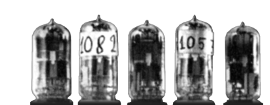

HMR is a research project about Computer Science History.
The aim of HMR is to recovery and disseminate the history and the technology of old computing devices, with a special focus on the Italian ones. HMR has both historical and technological goals:
The usual way to keep alive the old machines is by maintaining in running conditions the originals. Another possibility is by building hardware replicas. HMR likes in particular a third way: using today simulation techniques to make software emulators of the past machines.
HMR aims to share its research results with a wider audience. Promoting a rational vision of information technology and its history is a goal of HMR. HMR research is at the basis of exhibitions, culltural events and educational activities.
HMR started in 2006. The first simulator of the MR was presented to the public in 2009. In 2011, thanks to HMR commitment, reopened in Pisa the Museum of Computing Machinery. In 2015 has been launched the Computer Science History course at the Digital Humanities degree of the Univerity of Pisa.
Hacking. In order to rebuild the computers of the past it is mandatory to fully understand their technology. A superficial knowledge does not suffice: all the details have to be explored and understood with curiosity and commitment. Just like it is written in the definition of hacker given in the Jargon File.
The Macchina Ridotta. Macchina Ridotta (MR, meaning Smaller Machine) was the nickname of the first Calcolatrice Elettronica Pisana (CEP, Electronic Calculator of Pisa). The MR was also the very first computer designed and built in Italy, in July 1957. A second CEP followed in 1961.
The MR has been the first computer investigated by the HMR project. Today HMR has widened its research goals, but MR remains in the acronym to highlight the origins and the first important success of the project.
The first CEP was almost completely disappeared from the history of Italian computer science, which reported only the second one. The recovery of the blueprints and their in-depth understanding led to the rediscovery of the first computer built in Italy and made possible to fully comprehend its achievements and its relevance. From an historical point of view, HMR added a whole new chapter to the annals of Italian computer science.
Experimental Archeology. Information technologies had an extremely quick development. The hardware was (and still is) superseded year by year. Old machines are forgotten, often scrapped. The other half of computer science, the software, was encoded
in obsolete formats and the storage media degrade with time. The documentation is lost, often it was incomplete since the beginning. Men and women protagonists of the events are often still with us, but we cannot ask them to remember the details of such complex systems.
We need to dig in warehouses and archives, decode the old formats and notations,
reassemble the pieces, make comparisons with other contemporary artifacts, always referring only to the technological knowledge of the time. Gaps need to be filled with hypotheses which have to be checked and validated experimentally through simulations and replicas.
Due to the project focus and its target audience, the web pages of HMR are mostly in Italian.
Here is a selection of english documents about the HMR research and activities.
G.A. Cignoni, E. Meloni, “KB-Driven Information Extraction to Enable Distant Reading of Museum Collections”, talk at the 6th AIUCD Conference 2017, Roma, January 26-28 2017 (paper presentation)
G.A. Cignoni, G.A. Cossu, “The Global Virtual Museum of Information Science & Technology, a Project Idea”, proceedings of International Communities of Invention and Innovation - IFIP WG 9.7 Int. Conference, New York, May 25-29 2016, in (A. Tatnall & C. Leslie eds.) IFIP Advances in Information and Communication Technologies, Springer, 2016, n. 491, pp. 101-114 (roundtable presentation, paper presentation)
G.A. Cignoni, “Functional or appealing? Traces of a long struggle”, talk at the 3rd Int. Conference on the History and Philosophy of Computing, Pisa, October 8-11, 2015 (ext. abstract, presentation)
G.A. Cignoni, L. Cappellini, T. Mongelli, “Games, from Engaging to Understanding: a Perspective from a Museum of Computing Machinery”, proc. of 14th International Conference on Entertainment Computing, Trondheim, Spetember 30 - October 2, 2015 (poster).
G.A. Cignoni, F. Gadducci, S. Paci, "A Virtual Experience on the Very First Italian Computer", in ACM Journal on Computing and Cultural Heritage, Vo. 7, No. 4, 2014.
G.A. Cignoni, F. Gadducci, G. Lettieri "Rebuilding/Interacting at the Museum of Computing Machinery of Pisa", poster at RICHES First International Conference - Cultural Heritage: Recalibrating Relationships, Pisa, December 4-5, 2014.
G.A. Cignoni, F. Gadducci, "Designing an exhibition about the history of personal computing", poster at XXIII Congresso dell'Associazione Nazionale dei Musei Scientifici, Venezia, November 13-15, 2013 (abstract).
G.A. Cignoni, F. Gadducci, "A Syllabus for the Fifties, Teaching Computer Science on the first Italian Computers", talk at the 2nd Int. Conference on the History and Philosophy of Computing, Paris, October 28-31, 2013 (slides).
G.A. Cignoni, F. Gadducci, "Les premiers ordinateurs Olivetti: Deux études de cas in brand making", talk at the
Conservatoire National des Arts et Métiers, Paris, June 25, 2013.
G.A. Cignoni, F. Gadducci, "Using Old Computers for Teaching Computer Science", proc. of Making the History of Computing Relevant - IFIP WG 9.7 International Conference, (A. Tatnall et alii eds.) Springer, Science Museum, London, June 17-18, 2013, ISBN: 978-3-642-41649-1 (slides).
G.A. Cignoni, "Computer Science Illustrated through Old Computers", talk at Knowledge Triangle - New formulas for
science communication, Pisa, May 24, 2013.
G.A. Cignoni, S. Paci "UML Modelling and Code Generation For Agent-based, Discrete Events Simulation", proc. of International Workshop on Applied Modeling and Simulation, Roma, September 24-27, 2012, ISBN: 978-88-97999-06-5 (slides).
G.A. Cignoni, F. Gadducci, "Rediscovering the Very First Italian Digital Computer", proc. of IEEE 3rd HISTory of ELectro-technology CONference, Pavia, 5-7 settembre 2012, ISBN: 978-1-4673-3079-4 (slides, on IEEExplore).
G.A. Cignoni, F. Gadducci, "Experimental Archeology of Computer Science", proc. of II Congresso La ricerca scientifica in Museo,
Calci (Pi), May 25-26, 2012, Soc. Toscana di Scienze Naturali, Mem. Serie B, 119, 2012.
G.A. Cignoni, F. Gadducci, A. Rubinelli, "When Hackers Rewrite History: the Lost Machine of Pisa", talk at
13th Vintage Computer Festival Europe, Munich, April 28, 2012.
G.A. Cignoni, "HMR: Rediscovering and Rebuilding", posters at 13th Vintage Computer Festival Europe, Munich, April 28, 2012.
In the years, the research of HMR has been funded by Fondazione Galileo Galilei, Fondazione Pisa, Fondazione Cassa di Risparmio di Lucca, Associazione Italiana per l'Informatica e il Calcolo Automatico, Regione Toscana / Pianeta Galileo.
Among the other istitutional partners of HMR activities we cite: Museum of Computing Machinery, INFN Section of Pisa, Dept. of Information Engineering, Computer Museum of Novara, Graphics Museum of Pisa, Internet Festival, Science Festival of Genova, All About Apple in Savona.
The first web site of HMR was hosted at the Dept. of Computer Science of the University of Pisa.